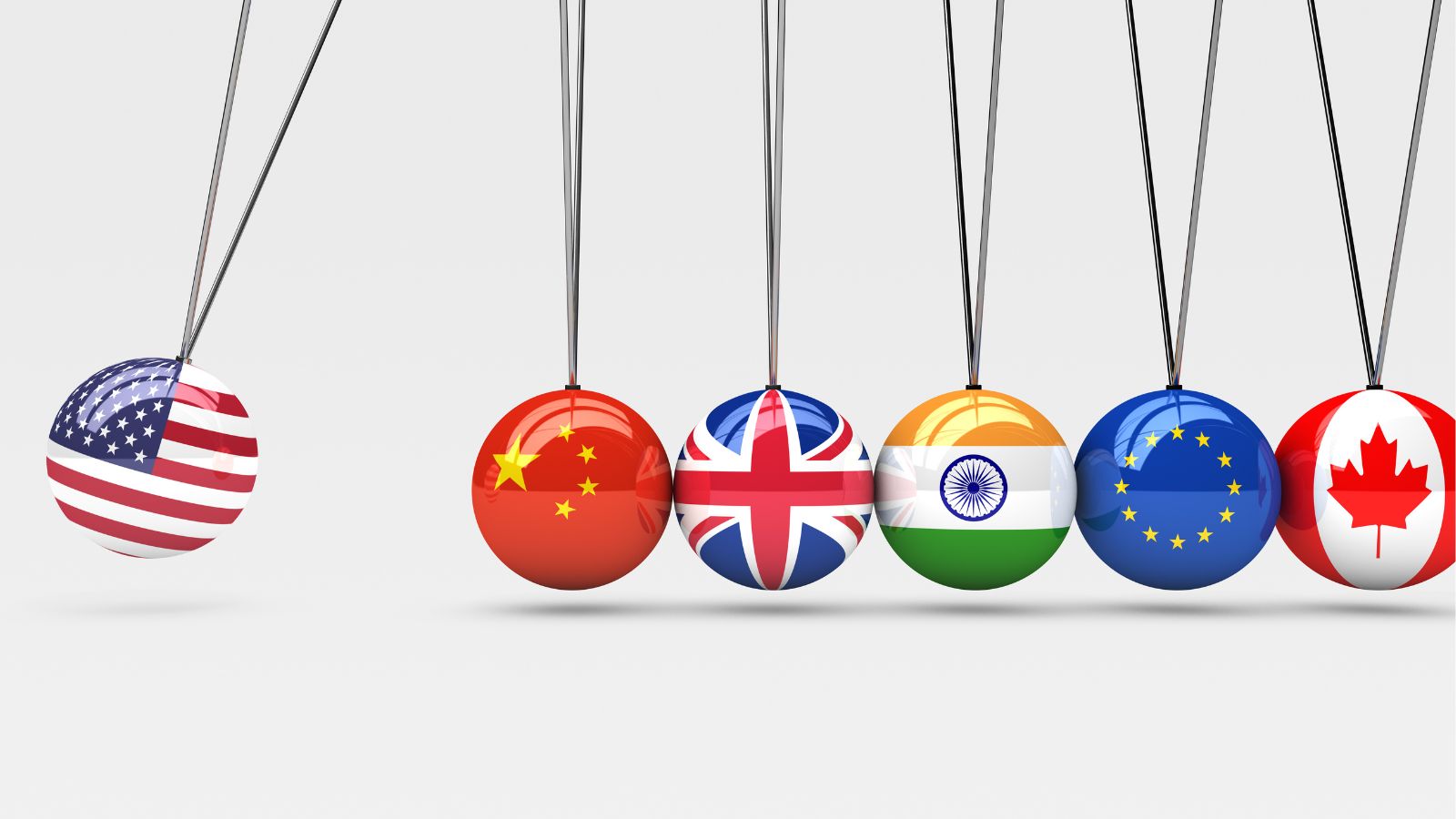In the evolving landscape of global trade, Canada has steadily built stronger and more reliable partnerships than the United States. While the U.S. has faced trade disputes, tariff wars, and diplomatic tensions, Canada has positioned itself as a stable and cooperative player in the international market. With strategic trade agreements, a business-friendly reputation, and a commitment to sustainability, Canada continues to expand its economic influence. From strengthening ties with the EU and Asia to expanding exports in key industries such as technology, energy, and agriculture, Canada’s trade relationships are flourishing. Here’s why Canada’s trade partnerships are proving to be more resilient and beneficial than those of its southern neighbor.
Stable Trade Relations with the European Union

Stronger Ties with China Despite Global Tensions

While U.S.-China relations have been turbulent due to tariffs and political disputes, Canada has maintained a more balanced approach. Canadian exports, particularly in the agricultural and natural resources sectors, continue to flow to China. This stability enables Canada to tap into one of the world’s largest consumer markets. As a result, trade disruptions are less severe than those faced by American businesses.
A More Cooperative Approach to Mexico

Under the Canada-United States-Mexico Agreement, Canada and Mexico have strengthened their trade relationship. While the U.S. has had disputes with Mexico over manufacturing and labor issues, Canada has avoided major conflicts. This has enabled smoother trade in key sectors, such as automotive and agriculture. Canada’s strong diplomatic ties help maintain a more reliable supply chain.
Expanding Trade with the Indo-Pacific Region

Canada has aggressively expanded trade relations in Asia through the Comprehensive and Progressive Agreement for Trans-Pacific Partnership. This provides Canadian exporters with access to fast-growing economies, such as Japan, Vietnam, and Australia. The U.S. withdrew from the original Trans-Pacific Partnership, missing out on these opportunities. Canada’s involvement secures its place in the growing Indo-Pacific market.
Favorable Trade Relations with the UK

Following Brexit, Canada quickly negotiated a trade continuity agreement with the UK to ensure seamless commerce. This deal helps Canadian industries, such as agriculture, manufacturing, and finance, maintain strong exports. The U.S., on the other hand, has struggled to finalize a trade agreement with the UK. Canada’s swift action has strengthened its foothold in this important market.
Less Trade Volatility Compared to the U.S.

Canada’s trade policies are seen as more predictable and stable, making it an attractive partner. The United States has imposed tariffs on its allies, leading to uncertainty and retaliation from trading partners. Canada’s diplomatic and trade consistency prevents such disruptions. This reputation makes Canada a preferred partner for long-term agreements.
A Stronger Reputation in Environmental and Ethical Trade

Canada is recognized for its commitment to ethical trade, environmental protection, and fair labor practices. Many countries prefer to trade with nations that prioritize sustainability and respect for workers’ rights. The U.S. has faced criticism for rolling back environmental protections, which has made some partners hesitant. Canada’s clean energy and ethical business practices enhance its global trade appeal.
Thriving Agricultural Exports to Global Markets

Canadian agricultural products, including wheat, canola, and seafood, are in high demand worldwide. Trade agreements help Canadian farmers access lucrative markets with fewer restrictions. Meanwhile, U.S. farmers have faced export challenges due to tariff disputes with major buyers like China and the EU. Canada’s agricultural trade continues to grow steadily, boosting its economic resilience.
A Stronger Standing in Africa’s Emerging Markets

Canada has been increasing its trade engagement with African nations, particularly in the areas of natural resources, agriculture, and technology. Unlike the U.S., which has been slower in establishing new trade partnerships with Africa, Canada is actively investing in the continent’s growing markets. This positions Canada as a key partner for Africa’s future economic expansion.
A More Business-Friendly Global Perception

Canada is regarded as a stable and reliable country for conducting business, thereby fostering foreign trade. The U.S., on the other hand, has faced political tensions that have made some countries wary of long-term agreements. Canada’s robust banking system, robust regulatory framework, and trade-friendly policies enhance its economic influence. These factors enable Canada to establish stronger trade partnerships than the U.S. in many regions.
Increased Trade with South Korea

Through the Canada-Korea Free Trade Agreement (CKFTA), Canada has built a strong economic relationship with South Korea. This has enabled Canadian companies to expand their exports in key sectors, including energy, technology, and automobiles. The U.S. has also pursued trade with South Korea but has faced disputes over tariffs and regulations. Canada’s agreement ensures smoother trade flows and business cooperation.
Leadership in the Global Mining Industry

Canada is a significant player in global mining, supplying essential minerals that are crucial for technology, energy, and infrastructure development. Countries worldwide depend on Canadian expertise and resources, strengthening trade relationships. The U.S. has seen increased competition in this sector, while Canada continues to dominate in mining investments and exports. This gives Canada a strategic advantage in global trade.
More Favorable Trade Policies with Latin America

Canada’s trade agreements with Latin American countries, such as Chile, Peru, and Colombia, have boosted economic ties. These partnerships have created a strong demand for Canadian goods and services. The United States has faced challenges in maintaining stable relations with certain Latin American nations. Canada’s proactive approach to trade diplomacy has resulted in steady growth in the region.
A Leading Role in Global Energy Exports

Canada is one of the world’s largest exporters of oil, natural gas, and hydroelectric power. Many countries prefer Canadian energy due to its stability and reliability. The United States has undergone shifts in its energy policy, which have impacted the confidence of its trade partners. Canada’s consistent energy exports make it a trusted global supplier.
Stronger Economic Ties with India

Canada has been strengthening trade relations with India, one of the world’s fastest-growing economies. Bilateral agreements in technology, education, and natural resources have created new business opportunities. The United States has had periodic trade conflicts with India, which has limited its economic ties. Canada’s approach has yielded more stable and beneficial trade agreements.
A Growing Role in the Tech Industry

Canada has emerged as a global leader in technology, attracting significant investments from international companies. The country’s strong support for innovation and research has made it a preferred trade partner. The U.S. remains a tech hub, but political and regulatory uncertainties have prompted some businesses to relocate to Canada. This shift gives Canada a growing influence in the global tech trade.
Lower Trade Barriers in Key Industries

Canada has fewer trade restrictions in industries like automotive, pharmaceuticals, and consumer goods. This enables smoother business transactions and promotes economic growth. The United States has imposed tariffs and regulatory hurdles, creating trade tensions. Canada’s more open trade environment strengthens its global partnerships.
A Stable Political Environment That Attracts Trade

Canada’s political stability makes it a preferred trade partner for many nations. The U.S. has experienced trade uncertainty due to political shifts and changing policies. Countries seeking long-term trade agreements often choose Canada due to its predictability. This has helped Canada maintain strong economic relationships worldwide.
An Attractive Market for Foreign Direct Investment

Canada continues to attract significant foreign investment in key industries such as finance, technology, and energy. Strong investor protections and economic stability make Canada a desirable location for business expansion. The U.S. faces increased competition for foreign direct investment due to its political and economic fluctuations. Canada’s steady growth makes it a safer bet for global investors.
Canada’s Commitment to Multilateral Trade Agreements

Unlike the U.S., which has sometimes pursued isolationist trade policies, Canada remains committed to multilateral trade agreements. This approach strengthens relationships with multiple countries simultaneously, fostering a more interconnected economy. Canada’s willingness to cooperate on global trade frameworks makes it a more attractive and stable partner than the U.S.
Conclusion

Canada’s approach to trade has been marked by stability, diplomacy, and long-term strategy, allowing it to form stronger partnerships worldwide. While the U.S. grapples with trade conflicts and shifting policies, Canada continues to expand its reach, securing valuable agreements and attracting foreign investments. With a focus on sustainability, ethical business practices, and economic cooperation, Canada’s trade network is more resilient than ever. As global markets evolve, Canada’s ability to maintain strong trade ties positions it as a leader in the international economy, giving it a competitive edge over the U.S. in the years to come.
25 Countries Predicted to Become Economic Superpowers in the Next 20 Years

The strength of an economy plays a crucial role in various international policies about trade and relations. Certain factors determine the strength of an economy, including population growth, availability of resources, and development and advancement. Here are 25 countries predicted to become economic superpowers in the next 20 years
25 Countries Predicted to Become Economic Superpowers in the Next 20 Years
